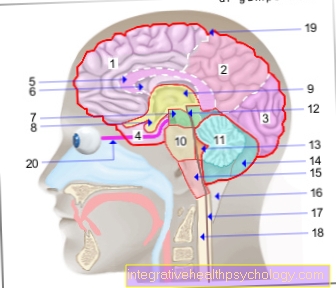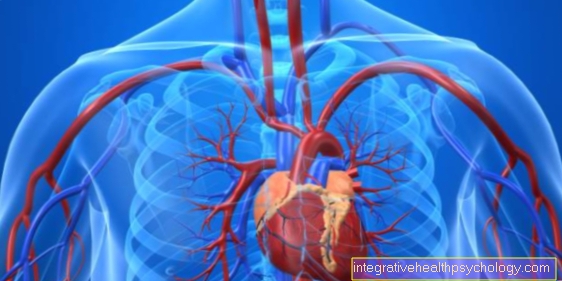Why does a cough occur when the heart is weak?
When you cough, you shouldn't always think about a bronchial infection. A so-called "heart cough" can also be behind the symptom. There can be various causes behind the bronchial irritation. Typically, chronic heart failure or acute heart failure are accompanied by symptoms in the respiratory organs. Often the weak heart is noticeable through shortness of breath, but a slight irritable cough can also appear accompanying it. The cough itself is not a major threat, but it is a symptom of a life-threatening illness.

causes
Heart cough is the result of acute or chronic heart failure, which can have various consequences. The ability of the heart muscles to pump is restricted due to various underlying diseases, which restrict the blood supply to the body. The blood in the heart cannot be pumped forward sufficiently, causing it to partially back up into the right heart and venous system.
Further information on the subject can be found at: Heart failure
The blood also partially backs up in the pulmonary vessels, so that the increased pressure can lead to water retention in the form of pulmonary edema. The congestion of the blood in the pulmonary circulation can also lead to a blockage and irritation of the bronchi, which creates the feeling of a coughing stimulus. However, this cough alone has no disease value and is also not related to an infection.
This article might also interest you: Water in your lungs- what to do about it
diagnosis
A suspected diagnosis can often already be made on the basis of an anamnesis survey by questioning the condition and symptoms and a subsequent physical examination. Typically, those affected describe a general weakness and reduced performance. With advanced stages, more serious symptoms of heart failure can occur, which indicate that the body cannot adequately compensate for the lack of cardiac output.
The physical exam can be used to examine and quantify typical signs of heart failure. Heart echo or cardiac catheter examinations are used to accurately measure the extent of the disease. Here the heart movements and ejection performance can be measured precisely. A backlog of the blood can often be noticed first in an X-ray of the chest.
Read more on the topic: These tests are done if you have heart failure
Concomitant symptoms
The symptoms of heart failure can vary and be diverse. Their severity depends on the stage of the disease and the body's response. With heart failure, the heart does not pump enough blood through the body, which can lead to insufficient supplies of cells and organs in the body and venous blood to back up in front of the heart. Those affected often report weakness, malaise, chest pain, shortness of breath, rattling breathing, leg edema, abdominal fluid and cough. These symptoms can appear in different combinations and forms depending on the severity of the heart failure.
In very advanced cases, the most severe shortness of breath and weakness can predominate and the shock situation can lead to a loss of consciousness. Numerous other diseases also often occur in combination with cardiac insufficiency. For example, coronary artery disease, diabetes mellitus or COPD are typical concomitant diseases that in turn are associated with severe symptoms.
Read more on the topic: Symptoms of heart failure
mucus
A so-called “cough with sputum” can appear as a symptom in various diseases. The sputum is mostly mucus, which can occur due to infectious agents in the mucous membrane but also in the course of heart failure. When the heart is weak, the blood backs up into the pulmonary circulation, which is why fluid passes into the lungs and edema and bronchial irritation can be caused.
The mucous membranes can produce a slimy secretion, which leads to a strong urge to cough and can be coughed up when coughing. Sometimes large amounts of mucus can be coughed up. This mucus can also be examined for potential infectious agents in order to rule out an underlying infection.
Blood in the cough
Blood in the cough can be harmless and temporary, or it can be a warning symptom of a dangerous illness. Often there are temporary irritations of the bronchial mucosa behind the blood in coughing. Heart failure can also trigger the symptom. The bronchial tubes are irritated by the congestion of blood in the lungs, which can lead to small bleeding of the mucous membranes.
Larger amounts of blood in the cough may need to be examined more closely, as tumor diseases or severe lung infections can also be behind the symptom.
treatment
The treatment of the so-called "heart cough" is mainly carried out by treating the weak heart. Heart failure can be temporary or chronic, depending on the underlying disease and the extent of damage to the heart muscle cells. This is often caused by diseases of the coronary arteries that can be traced back to risk factors such as smoking, obesity and diabetes. Control of these risk factors plays a critical role in maintaining heart health.
In the treatment of existing chronic heart failure, a healthy diet and moderate exercise can also slow the progression of the disease. For the symptomatic treatment of heart failure, various drugs can be used that reduce the heart's action, decrease blood volume and prevent potential complications.
Read more on the topic: Heart failure therapy
Duration / forecast
The duration of the heart cough is difficult to predict because the cough can be a fluctuating symptom of chronic heart failure. As part of the disease, the cough can occur temporarily and then subside on its own. Heart failure is in many cases a chronic disease that can be accompanied by symptom-free intervals and, on the other hand, with acute so-called "decompensations".
In the long term, heart failure limits life expectancy. The cough in heart failure indicates advanced congestion of the blood in the pulmonary circulation in an advanced stage of the disease.
Read more on the topic: Life expectancy with heart failure
Course of disease
The course of heart failure can be very variable. It can develop slowly and seemingly without a cause over the years, or it can be traced back to a specific event such as a heart attack. The heart failure is usually noticeable through increased shortness of breath with little physical activity. Over the years, heart failure can worsen and be accompanied by temporary symptoms such as shortness of breath, rattle, leg edema, ascites and heart cough.
In the long term, this can seriously damage the lungs and liver. An advanced heart failure is associated with a significantly reduced life expectancy, as life-threatening pulmonary edema can develop. In the chronic stage, the disease can only be cured by a heart transplant.
Recommendations from the editorial team
- Heart failure
- Difficulty breathing due to a weak heart
- Can you recognize a heart failure in the EKG?
- Heart failure and blood pressure - what is the connection?
- Cardiac asthma























.jpg)





